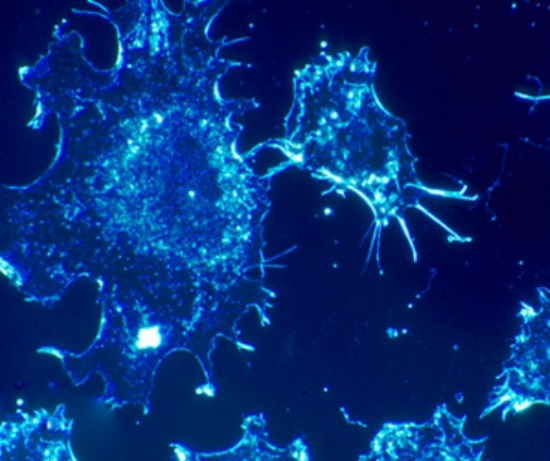Take That, Cancer!
The war on cancer has been going on for more than 40 years. Here are 10 small—and maybe not so small—victories scientists have had this year
![]()

Know the enemy: Cancer cells at work. Image courtesy of the National Cancer Institute
As we come to the end of Breast Cancer Awareness Month, I’ve learned that sometimes you can have too much awareness. A friend died of breast cancer last week and the truth is I didn’t want to hear much more about it.
On second thought, though, maybe it helps to look cancer in the eyes and show that it’s not the monster it can seem to be, that slowly progress continues to be made in moving toward a cure. My friend Trish used to say, “Take that, cancer!” in those times when it seemed that she was winning the battle.
So here’s a “Take that, cancer!” list, 10 ways in which scientists have come one step closer to taming the beast.
1) It’s important to stop cancer cells from talking to each other: That’s what a recent paper written by researchers from Johns Hopkins, Tel Aviv University and Rice University argues. They contend that we need to recognize that tumor cells are a lot smarter and more collaborative than long thought and the key to fighting them is to learn how to interrupt their conversations.
2) And it helps to be able to see inside them: A new MRI technology, being developed at the University of California at San Francisco, could give physicians a better idea of whether or not a particular treatment for tumors is working.
3) Green tea could help fight cancer: A study of breast cancer patients found that those who received a regular treatment of green tea extract had significantly lower tumor growth than those women who didn’t. Scientists said chemicals in green tea called polyphenols appear to inhibit two proteins that promote tumor cell growth and migration. The extract may help prostate cancer patients.
4) So might multivitamins: A clinical trial that followed nearly 15,000 male doctors for more than a decade determined that those who took a multivitamin every day were 8 percent less likely to develop cancer than those who received a placebo. Cancer experts point out, however, that it’s a less effective strategy than a healthy diet, exercise and not smoking.
5) And fasting could make chemo more effective: A study published earlier this year from the University of Southern California at Davis reported that mice that were given only water for two days before chemotherapy treatments experienced more shrinkage of tumors than mice that stayed on their usual diets. The researchers suggested that fasting appears to protect normal cells from chemo’s toxic effects by causing them to focus on internal maintenance instead of growing and reproduction.
6) Could a smart bra replace mammograms?: That’s what testing by a Nevada company named First Warning Systems suggests. It has designed a bra with sensors that measure tiny temperature changes that occur as blood vessels grow and feed tumors. The company says that in three clinical trials involving 650 women, the bra was able to detect the beginnings of tumors as many as six years before imaging would have. The bra could be available in Europe next year and in the U.S. in 2014, pending FDA approval.
7) And could a simple blood test predict breast cancer risk?: According to a team of Boston researchers who analyzed the results of a long-running study, women with high levels of three hormones were more likely to develop breast cancer. If the research is confirmed, it could mean that women could be tested for the hormones every 10 to 20 years to assess their cancer risk.
8) There’s an explanation for the obesity-cancer link: Scientists have long known that obese patients with cancer often have a poorer chance of survival than those at a healthier weight. New research may explain why. A report in the journal Cancer Research suggests that fatty tissue, known as white adipose tissue, contains cells that, once in a tumor, can become part of blood vessels that foster tumor growth.
9) There may be a way to counter “chemo brain”: A clinical study published in Breast Cancer Research and Treatment concluded that women who suffer from “chemo brain,” –cognitive problems that occur during and after cancer treatment–can improve their memory and their mental health through computerized brain training.
10) Finally, could magnets be an answer?: The research is still preliminary, but South Korean scientists are reporting success in using tiny magnets to cause tumor cells to self-destruct. The magnetic therapy, used so far on living fish and bowel cancer cells, involves creating tiny iron nanoparticles attached to anti-bodies produced by the body’s immune system, When they bind to tumor cells and a magnetic field is applied, the molecules can trigger a ”destroy” signal.
Video bonus: Yes, it’s possible to be funny about breast cancer. All it takes is to have a few bare-chested hunks give women a little advice.
More from Smithsonian.com
/https://tf-cmsv2-smithsonianmag-media.s3.amazonaws.com/accounts/headshot/randy-rieland-240.png)
/https://tf-cmsv2-smithsonianmag-media.s3.amazonaws.com/accounts/headshot/randy-rieland-240.png)